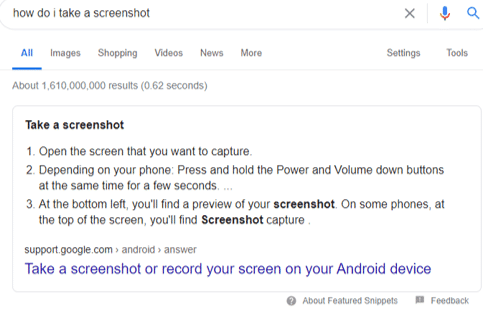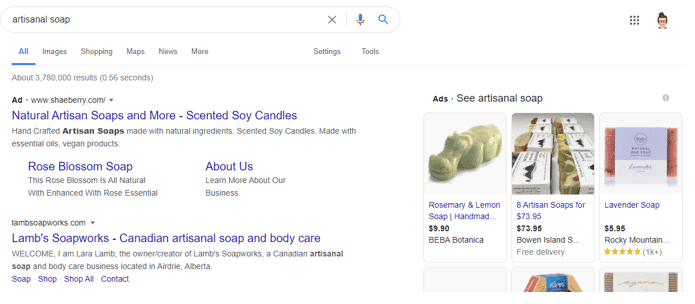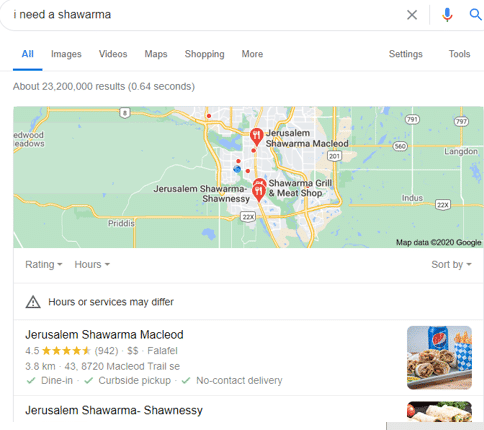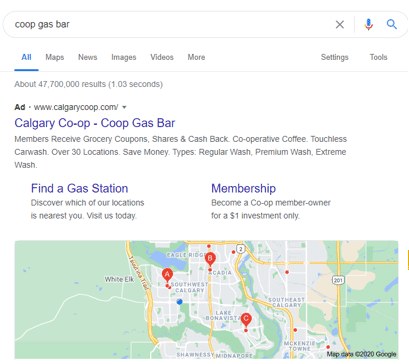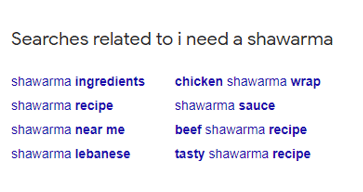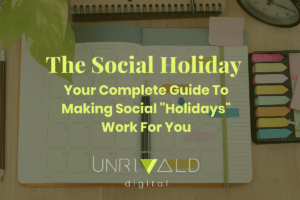Understanding how search works is critical for today’s marketing professional. It’s not enough to sprinkle some keywords into your copy and hope you’ve nailed it. It’s not enough to focus on brand messaging without thinking about how you’re aligning your message with what and how people search.
User search behaviour can be easily categorized, mapped to the marketing funnel, and then leveraged to ensure your messaging matches a searcher’s intent.
Search intent: Informational
Informational searches comprise between 50-80% of all searches on Google. They often take the form of a question like how do I take a screenshot.
Google will deliver results that answer their questions without directing them to a site that produces a corresponding product or service.
These searches are informational in nature, as users seek to define the problem they have. In other words, they are aware they have a problem, but may lack the terms to describe the problem.
In fact, it will deliver an answer in a snippet that can answer the question without requiring a user to visit your site at all! Approximately 20% of searches are resolved by the information provided in a snippet, meaning a user never needs to leave their results page to find the answer they’re looking for.
Top of the funnel
Marketers know that clients at the top of the funnel are nowhere near ready to buy, and the same is true of searchers. What is…? and How do I…? questions are not shopping-oriented, and if they can be resolved via a snippet, there’s little marketing value in these queries.
There is little value in optimizing your website for searchers in this space for two reasons: they aren’t ready to buy, and they aren’t using product- or industry-specific keywords.
That’s not to say that that strictly how-to content lacks value (it is evergreen, it can generate awareness and boost your overall EAT, and so on), but it is unlikely to directly lead to sales.
Search intent: Transactional
Transactional searches happen in the middle to bottom of the funnel, so they have more obvious value to marketers. Transactional searchers are researching their problem and looking at different solutions to it. They have a pretty good idea what their problem is and they’re using appropriate terminology and keywords to find the solution.
In contrast to informational searches, Google responds to this type of intent by offering up shopping opportunities for searchers who are further down the funnel.
In the example below, a search for the keywords artisanal soap produces sponsored ads, sites optimized for that keyword, and images of products that can be purchased. Google understands the difference between this query and a more informational what is artisanal soap, recognizing purchase intent over knowledge seeking by the way the query is formed: no interrogative, shorter format and so on.
Middle of the funnel
Marketers can begin to optimize their sites for these kinds of queries by examining search trends, listening to how customers describe the products (versus how the company prefers to describe them), identifying what their competitors are doing, and optimizing accordingly.
Mid-funnel shoppers may not be quite ready to buy – but getting them to visit your site allows you to speak to the value of what you’re offering. But it’s critical to remember: if they don’t find your site when searching, then they aren’t seeing that messaging and aren’t considering your product or service instead of a competitor’s.
Incorporating mid-funnel search terms into your overall site SEO strategy will produce benefit over the long-run and may help you raise your overall positioning for searches in your category. Google ad purchases in this space are not as expensive as bottom-of-the-funnel queries, so may be a useful addition to your search advertising spend.
Queries that have a navigational intent are marketing goldmines: these users are looking for a thing and even if they don’t use terms like near me or in [my city], Google recognizes that they want to see a map, with top choices displayed as part of the local pack.
And that’s where a smart marketer wants to appear!
You absolutely want to optimize your site for navigational searches, whether you sell products or services. I need a shawarma could easily be …a massage, …a lawyer, …a vacation. These are users whose wallets are essentially out.
Bottom of the funnel
As many as 75% of location services result in a same-day store visit. And in COVID times, that may also mean a virtual visit. In either case, the purchase intent is clear, and you want your site to do everything it can to capture these searchers.
It’s surprising how many businesses aren’t optimizing their sites for these spend-ready consumers. Many lack clear address information – including the city where they operate! Many have not created a Google My Business account to capture Google reviews, showcase images and accommodate a request for directions.
Your SEO strategy therefore needs to address these user’s needs and use clear terms to define what you offer. Navigational searchers aren’t looking for a business that can “optimize the paradigm” or “harness the synergies” – they want a business coach, or a business consultant. Dial back the messaging and use real terms that match with real searches. Don’t panic! You don’t need to toss all of your carefully honed value-add messaging – but find a way to incorporate straight talk into your site so that you aren’t missing straight-talking customers who want your services now.
Search intent: Branded
Branded searches are really a combination of other types of searches paired with a specific brand. It’s an area where small businesses may not perform well, but if yours is a well-known local business, you definitely want to optimize your site to appear in searches for your business name.
In this example, Google has determined that a search for co-op gas bar is transactional (so it offers up advertising and an opportunity to purchase a membership) as well as navigational (so it shows a map). In either case, because the search included co-op, it returned brand-specific information (membership) that wouldn’t appear in a more generic gas bar search.
Mid-Bottom of the funnel
A searcher who is including your brand in their searches is likely ready to make a purchase, though they could still be in the information-gathering stage of their purchasing journey, depending on the query.
In either case, the smart marketer wants to ensure that their site is appropriately optimized. Note that Co-op uses both the term Gas Bar and Gas Station – one is their preferred brand term (bar) and the other is a more search-friendly generic term (station). Using this kind of synonym approach in your SEO strategy is important. You want to include the language that your customers use, not just your preferred branding message.
Hint: Google can help you figure that the language to use
At the bottom of most searches, Google offers a set of search terms related to your query. This can be a fantastic way for a marketer to find common-language synonyms that may be useful in optimizing your site.
In this example, there appears to be interest in recipes, so perhaps my site needs to speak about the family shawarma recipe that my restaurant uses.
There are searches for ingredients, which would be easily covered off in a statement about the quality ingredients we use in our shawarmas. And so on.
There are many tools, free and paid, to help you find those synonyms and plain language to describe your business to help you improve how your content aligns with shoppers’ search intent, so don’t ignore them. Too many businesses fall in love with their own marketing spiel, and neglect to speak the language of their customers.
As we always say: if your customers can’t find you on Google, you don’t exist. And if you don’t exist, they won’t be giving you their money!
Obligatory sales pitch
Unrivald Digital loves helping businesses optimize their site to improve their ranking on Google, both technically as well as by helping them understand how potential customers search for products and services like theirs. Contact us today for a free, no-obligation consultation to learn how we can help your business find new business via search.



